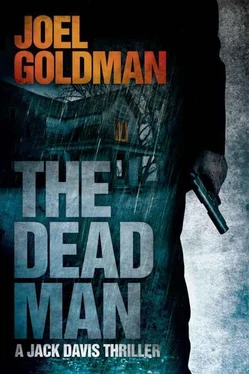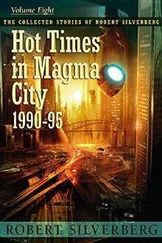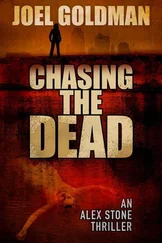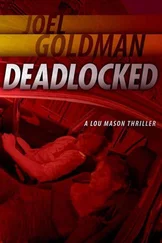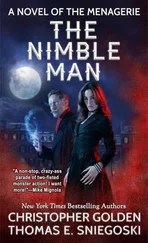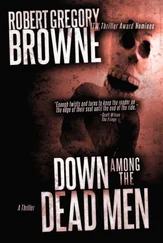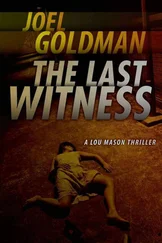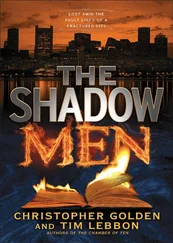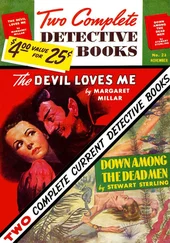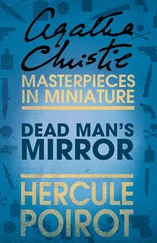Joel Goldman - The Dead Man
Здесь есть возможность читать онлайн «Joel Goldman - The Dead Man» весь текст электронной книги совершенно бесплатно (целиком полную версию без сокращений). В некоторых случаях можно слушать аудио, скачать через торрент в формате fb2 и присутствует краткое содержание. Жанр: Триллер, на английском языке. Описание произведения, (предисловие) а так же отзывы посетителей доступны на портале библиотеки ЛибКат.
- Название:The Dead Man
- Автор:
- Жанр:
- Год:неизвестен
- ISBN:нет данных
- Рейтинг книги:5 / 5. Голосов: 1
-
Избранное:Добавить в избранное
- Отзывы:
-
Ваша оценка:
- 100
- 1
- 2
- 3
- 4
- 5
The Dead Man: краткое содержание, описание и аннотация
Предлагаем к чтению аннотацию, описание, краткое содержание или предисловие (зависит от того, что написал сам автор книги «The Dead Man»). Если вы не нашли необходимую информацию о книге — напишите в комментариях, мы постараемся отыскать её.
The Dead Man — читать онлайн бесплатно полную книгу (весь текст) целиком
Ниже представлен текст книги, разбитый по страницам. Система сохранения места последней прочитанной страницы, позволяет с удобством читать онлайн бесплатно книгу «The Dead Man», без необходимости каждый раз заново искать на чём Вы остановились. Поставьте закладку, и сможете в любой момент перейти на страницу, на которой закончили чтение.
Интервал:
Закладка:
"I handled a serial killer case when I was in the DA's office. I'd say you're looking for someone who was abused when he was a kid."
"More likely than not."
"One of my psychology experts who, by the way is an honest whore, told me to focus on why Corliss became a psychologist. He said that a lot of people are attracted to the field because they want to figure out why they or their family are so screwed up. In Corliss's case, it was both. Turns out his family was a dysfunctional mess and Corliss had his own issues."
"Like what?"
"Like his father beat him, his mother, and brothers and sisters until one day his mother didn't get up off the floor. The father went to jail and the kids went to foster care. Corliss knew all about vulnerable kids like Kimberly Stevens because he'd been one."
"I'd say that made your odds of winning your case a lot better than seventy percent."
"Close as you can get in this business to a sure thing, except nothing makes me more nervous than a sure thing. What's it do for you?"
"Makes me nervous."
Chapter Fifty-seven
The storm died during the night, dawn breaking with the roar of grinding chain saws and the rumble of pavement scraping snowplows. Sunlight flashed across the frozen landscape, rebounding with a blinding glare, ice and snow a convex mirror.
The house lost power during the night, the digital clock in my bedroom saying three A.M., trailing my watch by four hours, when two enterprising kids who lived down the street rang the doorbell at seven, handed me my newspaper, and offered to shovel the driveway and front walk for fifty bucks. They laughed when Roxy and Ruby christened the snow around their boots, one of them exclaiming awesome, dude , while the other took video with his cell phone and uploaded it to YouTube. I hired them because my car was nowhere in sight, meaning that Lucy was digging Simon out of the snow instead of me.
I flattened the Kansas City Star on the kitchen counter, the headline above the fold-"Police Suspect Serial Killer"-knocking me back. A color picture of paramedics wheeling Anne Kendall's black-bagged body out of the Harper Institute was bordered on the right by a vertical stack of thumbnail headshots of her, Walter Enoch, Tom Delaney, and Regina Blair and, on the left side, by another stack featuring Milo Harper, Sherry Fritzshall, Anthony Corliss, Leonard Nagel, and me.
Mine was the Bureau's official photo, what we called the yearbook pose, eyes and head straight on at the camera, half-serious, half-smiling, and no toothy-goofy grin. It was the same picture the Kansas City Star had used when a reporter named Rachel Firestone did the stories on Wendy and the drug ring. She hadn't pushed when I refused to give her an interview, investigating the same way she wrote-tough but fair.
Rachel had the byline on this story, detailing the murders of Anne Kendall and Walter Enoch without embellishment, knowing that the facts packed all the punch she needed. She reported that the police had reopened their investigations into the deaths of Tom Delaney and Regina Blair, citing unnamed sources suggesting that they may have been the first two victims of a serial killer that also killed Enoch and Kendall. A police department spokesman called speculation about a serial killer premature but declined further comment, citing the sensitive nature of the ongoing investigation.
Special Agent Manny Fernandez, media spokesman for the FBI's Kansas City Regional Office, said that the Bureau was cooperating with the police department in the Walter Enoch murder investigation while also pursuing leads about another case that were developed based on the stolen mail found at Enoch's house, saying that they were close to making an arrest. Agent Fernandez declined comment when asked if the suspect in that case may be connected to the murders.
Firestone ended her story by reporting that Jason Bolt was filing suit against the Harper Institute for the wrongful deaths of Delaney and Blair, quoting Bolt's allegations that the institute had been negligent in its hiring and supervision of Anthony Corliss and alleging that the dream project was reckless, dangerous, and irresponsible. Bolt was quoted saying that he had been retained by Anne Kendall's parents and would be filing a wrongful death case on their behalf within the next week and that he was trying to locate any surviving heirs of Walter Enoch to make certain their rights were also protected. Rachel gave Sherry Fritzshall the last word, Sherry denying Bolt's allegations and calling the deaths of the dream project participants a tragedy for them, their families, and the institute.
The story stretched onto page two where there were sidebars written by Rachel and boxed in a panel alongside the main story. The first was about Leonard Nagel's criminal record, the second about the lawsuit against Corliss and the University of Wisconsin over Kimberly Stevens's death, and the third announced that Milo Harper had taken a leave of absence from the institute for personal reasons and that Sherry Fritzshall had replaced him as president. Sherry was quoted as saying that these changes had been planned for some time and were unrelated to the deaths of the dream project participants.
The last sidebar was about me, reprising my history with the FBI, the drug ring, Wendy, and my movement disorder. Firestone quoted Jason Bolt saying that the institute had waited too long to hire a director of security and then compounded that mistake by hiring someone whose disability should have disqualified him from the job, describing my hiring as part of the institute's continuing pattern of fatally flawed judgments.
I wasn't surprised by the newspaper coverage. The murders of Anne Kendall and Walter Enoch were sensational enough on their own. The prospect that they were victims of a serial killer was a reportorial windfall. Toss in a billionaire who walked away from the crown jewel of his empire without explanation, a registered sex offender killed while fleeing the police, and an ex-professor and an ex-FBI agent who left their last jobs under a cloud, all of whom worked for the billionaire, and Rachel Firestone must have felt like she'd died and gone to heaven twice over.
She had excellent sources, including, I assumed, Jason Bolt and Eric Abelson. Someone in the police department must have briefed her as well, no doubt off the record and only after Rachel promised anonymity.
The Bureau spokesman, Manny Fernandez, wasn't speaking off the record. He was sending me a message, reminding me that my forty-eight hours were almost up. Kent had promised me that if I didn't turn over the drug money, the Bureau would do things Dolan's way, which was shorthand for getting ugly.
It wouldn't matter whether they could make a case against me. They would ruin me with more than the innuendo hinted at in the newspaper. There would be a news conference. A sober-faced Fernandez would rehash the case, disclose Wendy's letter with the irresistible but unsupported conclusion of its contents, labeling me as a person of interest in the investigation of the missing money and encouraging me to come forward and tell what I knew.
They would bang the drum as often and as long as it took to convince the world that I had betrayed the public trust and gotten away with a crime. My denials and explanations would be footnotes to the story, my reputation the first casualty, my chance to spend the rest of my life doing more than wandering the aisles at the Bass Pro Shop the next. And, if they were lucky enough to find Wendy's letter and leverage it into an indictment, they would force me to spend my disability payments on attorney's fees before sending me to prison.
I couldn't sit back and wait for any of that to unfold, depending on luck and justice, both of which were blind, to get it right. Anthony Corliss was the lynchpin, the only name on my list of suspects whether the list was short or long. He didn't ooze menace like Anthony Hopkins in The Silence of the Lambs or any other cinematic thrill killer but evil isn't always obvious. More often it's hidden behind a banal facade, stunning us when it's finally revealed.
Читать дальшеИнтервал:
Закладка:
Похожие книги на «The Dead Man»
Представляем Вашему вниманию похожие книги на «The Dead Man» списком для выбора. Мы отобрали схожую по названию и смыслу литературу в надежде предоставить читателям больше вариантов отыскать новые, интересные, ещё непрочитанные произведения.
Обсуждение, отзывы о книге «The Dead Man» и просто собственные мнения читателей. Оставьте ваши комментарии, напишите, что Вы думаете о произведении, его смысле или главных героях. Укажите что конкретно понравилось, а что нет, и почему Вы так считаете.
